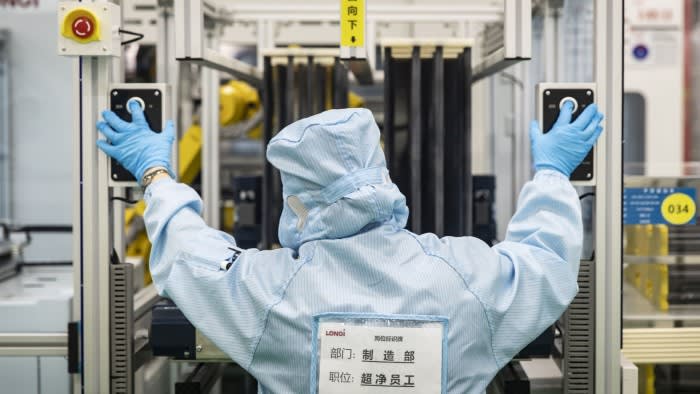

Unlock the Editor’s Digest for free
Roula Khalaf, Editor of the FT, selects her favourite stories in this weekly newsletter.
The EU has launched two investigations into Chinese solar panel manufacturers that Brussels said have benefited from market-distorting subsidies.
The probes reflect a hardening stance in Europe towards cheap Chinese imports, which the EU’s solar industry has blamed for the heavy losses and plant closures of several European solar panel manufacturers.
“Solar panels have become strategically important for Europe,” said the EU’s internal market commissioner Thierry Breton on Wednesday. “The two new in-depth investigations on foreign subsidies in the solar panel sector aim to preserve Europe’s economic security and competitiveness by ensuring that companies in our single market are truly competitive and play fair.”
The probe will focus on two consortiums bidding for the development of a solar park in Romania, part-financed by EU funds. One includes the German subsidiary of Longi Green Energy Technology, one of the world’s largest manufacturers of photovoltaic cells and solar panels. The other is made up of two European subsidiaries of the Chinese state-backed power company Shanghai Electric.
The European Commission said that “there are sufficient indications that both have been granted foreign subsidies that distort the [EU’s] internal market”.
Neither Longi nor Shanghai Electric immediately responded to a request for comment. Longi has previously warned that western countries should not cut out Chinese suppliers.
It is only the second time that the EU has opened an investigation under a foreign subsidies law that came into force in July last year. One EU official said that it was a “new regulation that we are testing”.
Under the rules, companies must notify Brussels of bids for public tenders when the estimated value of the contract is more than €250mn and when the company has received at least €4mn in subsidies from a country outside the EU in the preceding three years.
The first investigation, launched in February, involves the Chinese train manufacturer CRRC, which bid for an electric train contract in Bulgaria.
The China Chamber of Commerce to the EU said that it was “gravely concerned” that the new law had only targeted Chinese companies and that it was being used as a “tool of economic coercion to interfere with the reasonable and lawful economic operations of Chinese enterprises in the EU’s green and low-carbon transition market”.
Chinese imports have helped to increase solar power capacity rapidly in Germany and other European countries.
But European solar panel manufacturers have recently been affected by a growing glut of Chinese photovoltaic cells, with thousands of panels waiting in warehouses, unable to be installed because of a lack of grid connections or a shortage of skilled labour.
The surplus has been driven by a clean technology manufacturing boom in China, which has far outstripped domestic demand. Tough tariffs against Chinese imports in the US means that most excess panels are shipped to Europe.
Xuyang Dong of Climate Energy Finance, an Australian think-tank, said that “China’s estimated wafer, cell and module capacity that will come online in 2024 is sufficient to meet annual global demand now through to 2032. This shows an immense domestic solar production oversupply, which has resulted in price slump in solar components”.
EU solar panel manufacturers including France’s Systovi, Switzerland’s Meyer Burger and Norway’s REC Group have all shut plants in the past six months.
Meyer Burger, Europe’s largest solar panel manufacturer, on Wednesday completed a SFr207mn ($227mn) rights issue aimed at shoring up its business after revealing a SFr384mn pre-tax loss for 2023 last month.
Brussels has said it will commit to “assess all evidence of alleged unfair practices” and improve funding for solar panel manufacturers, according to a draft plan seen by the Financial Times and due to be signed by EU energy ministers and industry groups on April 15.
feed from www.ft.com